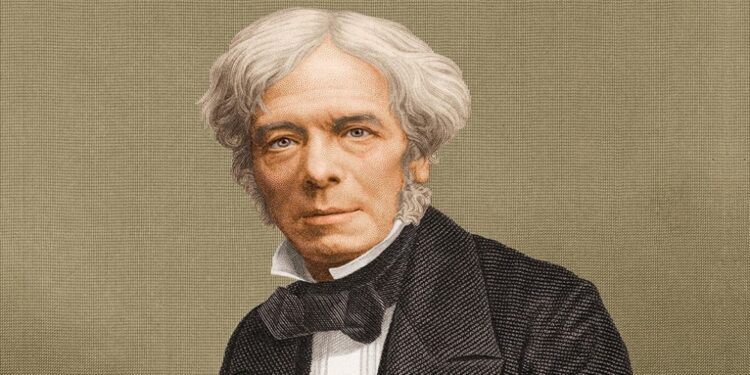Since the dawn of human civilization, history has witnessed the emergence of some truly great minds who have left behind an indelible mark. Outstanding figures across the fields of science, mathematics, philosophy, art, and literature have enriched human history in myriad ways. While some of these great minds have simplified our lives by developing useful technology, some others have contributed to medical science, enabling us to live healthier lives. Societies and civilizations have progressed to where we are today because of the work that these visionaries had as well as many others who followed in their footsteps.
Here are the top 20 greatest minds in history.
1. Michael Faraday
Michael Faraday was an English scientist who contributed to the study of electromagnetism and electrochemistry. His main discoveries include the principles underlying electromagnetic induction, diamagnetism and electrolysis. He is counted as one of the most influential scientists in history. Albert Einstein is said to have been deeply inspired by Faraday.
2. Nikola Tesla
Nikola Tesla was a Serbian-American inventor, electrical engineer, mechanical engineer, and futurist best known for his contributions to the design of the modern alternating current (AC) electricity supply system. His accomplishments were many as he had close to 300 patents under his name in 26 different countries. Tesla also created the first remote control, the first x-ray, and helped create the first hydroelectric plant.
3. Archimedes
Archimedes of Syracuse was a Greek mathematician, physicist, engineer, astronomer, and inventor from the ancient city of Syracuse in Sicily. He is regarded as one of the leading scientists in classical antiquity. Archimedes was the first person to use applied mathematics for describing the physical world. For instance, he discovered and formulated the laws of levers and pulleys, which today allow us to move very heavy objects with smaller forces.
Considered to be the greatest mathematician of ancient history, and one of the greatest of all time, Archimedes anticipated modern calculus and analysis by applying the concept of the infinitely small and the method of exhaustion to derive and rigorously prove a range of geometrical theorems, including: the area of a circle; the surface area and volume of a sphere; area of an ellipse; the area under a parabola; the volume of a segment of a paraboloid of revolution; the volume of a segment of a hyperboloid of revolution; and the area of a spiral.
He also discovered the law of buoyancy which allows huge metal ships to remain afloat in the oceans. Archimedes was also the first to use exponents in mathematics to write and define larger numbers. He derived an accurate approximation of pi. He is probably most famous for inventing outrageous war machines that kept the Ancient Romans from capturing Syracuse for several years.
4. Sir Isaac Newton
Sir Isaac Newton was an English mathematician, physicist, astronomer, alchemist, theologian, and author (described in his time as a “natural philosopher”) widely recognised as one of the greatest mathematicians and physicists of all time and among the most influential scientists. He was a key figure in the philosophical revolution known as the Enlightenment.
His book Philosophiæ Naturalis Principia Mathematica (Mathematical Principles of Natural Philosophy), first published in 1687, established classical mechanics, explaining the law of gravity and the laws of motion. Newton’s three laws of motion have had more impact on science than any other piece of work. These laws led to the treatment of gravity as a universal force, led to the discovery of planets, and ultimately to space travel.
Newton also made seminal contributions to optics, and shares credit with German mathematician Gottfried Wilhelm Leibniz for developing infinitesimal calculus, which can solve many problems of science, economics, and engineering that algebra cannot. He created the reflecting telescope, was the first to break light rays down to colors using a prism.
5. Alan Turing
Alan Mathison Turing was an English mathematician, computer scientist, logician, cryptanalyst, philosopher, and theoretical biologist. Turing was highly influential in the development of theoretical computer science, providing a formalisation of the concepts of algorithm and computation with the Turing machine, which can be considered a model of a general-purpose computer. He is widely considered to be the father of theoretical computer science and artificial intelligence.
6. Leonardo da Vinci
Leonardo di ser Piero da Vinci was an Italian polymath of the High Renaissance who was active as a painter, draughtsman, engineer, scientist, theorist, sculptor and architect. It is hard to find anyone else in history who had more expertise across a wider variety of areas than Da Vinci. A supreme polymath, Da Vinci investigated anatomy, astronomy, botany, cartography, painting, and paleontology.
He was an artist, sculptor and is credited with having an unprecedented imagination and ability to invent new ideas. He is credited with countless inventions and scientific discoveries. For instance, he invented a tank 400 years before it became a reality. He designed the mechanical Knight which was known as Leonardo’s robot. He designed a precursor to the modern-day diving suit.
And he also conceptualized the parachute, the helicopter, and landing gear before their time. In anatomy, Da Vinci conducted the most detailed study of the human body ever conducted. Before the 20th century, his study led to several discoveries in the field of anatomy. In art, Da Vinci was considered to be one of the greatest painters of all time. He created perhaps the most famous painting in all of history known as the Mona Lisa.
7. Pythagoras
Pythagoras of Samos was an ancient Ionian Greek philosopher and the eponymous founder of Pythagoreanism. His political and religious teachings were well known in Magna Graecia and influenced the philosophies of Plato, Aristotle, and, through them, Western philosophy. Pythagoras was credited by Plato with many key ideas in maths, science, ethics, and philosophy. As well as being credited with mathematical theorems.
8. Albert Einstein
Albert Einstein was a German-born theoretical physicist, widely acknowledged to be one of the greatest and most influential physicists of all time. Einstein is best known for developing the theory of relativity, but he also made important contributions to the development of the theory of quantum mechanics. Relativity and quantum mechanics are together the two pillars of modern physics.
His work provided empirical evidence of atomic theory as well as the existence of atoms and molecules. He also determined the size of molecules and verified Avogadro’s number. His mass-energy equivalence formula E = mc2, which arises from relativity theory, has been dubbed “the world’s most famous equation”. His work is also known for its influence on the philosophy of science.
He received the 1921 Nobel Prize in Physics “for his services to theoretical physics, and especially for his discovery of the law of the photoelectric effect”, a pivotal step in the development of quantum theory. His intellectual achievements and originality resulted in “Einstein” becoming synonymous with “genius”.
9. Max Planck
Max Karl Ernst Ludwig Planck was a German theoretical physicist whose discovery of energy quanta won him the Nobel Prize in Physics in 1918. Planck made many substantial contributions to theoretical physics, but his fame as a physicist rests primarily on his role as the originator of quantum theory, which revolutionized human understanding of atomic and subatomic processes.
10. Nicolaus Copernicus
Nicolaus Copernicus was a Renaissance polymath, active as a mathematician, astronomer, physician, classics scholar, and economist, who formulated a model of the universe that placed the Sun rather than Earth at its center. In all likelihood, Copernicus developed his model independently of Aristarchus of Samos, an ancient Greek astronomer who had formulated such a model some eighteen centuries earlier.
The publication of Copernicus’s model in his book De revolutionibus orbium coelestium (On the Revolutions of the Celestial Spheres), just before his death in 1543, was a major event in the history of science, triggering the Copernican Revolution and making a pioneering contribution to the Scientific Revolution. In 1517 he derived a quantity theory of money – a key concept in economics – and in 1519 he formulated an economic principle that later came to be called Gresham’s law.
11. Aristotle
Aristotle was a Greek philosopher and polymath during the Classical period in Ancient Greece. His writings cover many subjects including physics, biology, zoology, metaphysics, logic, ethics, aesthetics, poetry, theatre, music, rhetoric, psychology, linguistics, economics, politics, meteorology, geology, and government. Aristotle provided a complex synthesis of the various philosophies existing prior to him. It was above all from his teachings that the West inherited its intellectual lexicon, as well as problems and methods of inquiry.
As a result, his philosophy has exerted a unique influence on almost every form of knowledge in the West and it continues to be a subject of contemporary philosophical discussion. It is even said by many experts that Aristotle was possibly the last man to have known all the known possible fields in the world. These contributions in so many subjects have made Aristotle one of the most famous personalities of all time. He is widely regarded as one of the most influential persons who ever lived, offering insights into all aspects of human knowledge.
12. Galileo Galilei
Galileo di Vincenzo Bonaiuti de’ Galilei was an Italian astronomer, physicist, engineer, mathematician, and philosopher who played a major role in the Scientific Revolution during the Renaissance. Galileo has been called the “father” of observational astronomy, modern physics, the scientific method, and modern science.He made significant improvements to the telescope which led to extraordinary astronomical observations.
His observations of Venus proved that the Sun was the center of the universe and not the earth. He also discovered the four large moons of Jupiter. Galileo invented the thermoscope which paved the way for the invention of the thermometer. He also invented a more precise military compass. And his Galilean Invariance laid the groundwork for both Newton’s laws of motion and Einstein’s theory of relativity.
13. Louis Pasteur
Louis Pasteur was a French chemist and microbiologist renowned for his discoveries of the principles of vaccination, microbial fermentation, and pasteurization. His research in chemistry led to remarkable breakthroughs in the understanding of the causes and preventions of diseases, which laid down the foundations of hygiene, public health and much of modern medicine.
His works are credited to saving millions of lives through the developments of vaccines for rabies and anthrax. He is regarded as one of the founders of modern bacteriology and has been honoured as the “father of bacteriology” and as the “father of microbiology” (together with Robert Koch, and the latter epithet also attributed to Antonie van Leeuwenhoek).
14. Marie Curie
Marie Salomea Skłodowska Curie was a Polish and naturalized-French physicist and chemist. Her most notable accomplishment was the discovery of radium and polonium. Curie originally coined the phrase “radioactivity” and pursued it as a possible cure for cancer. She was the first woman to win a Nobel Prize, and the first person and the only woman to win the Nobel Prize twice.
She is also the only person to win the Nobel Prize in two scientific fields. Her husband, Pierre Curie, was a co-winner on her first Nobel Prize, making them the first ever married couple to win the Nobel Prize and launching the Curie family legacy of five Nobel Prizes. She was, in 1906, the first woman to become a professor at the University of Paris.
15. Charles Darwin
Charles Robert Darwin was an English naturalist, geologist and biologist, best known for his contributions to evolutionary biology. Darwin’s scientific discovery is the unifying theory of the life sciences, explaining the diversity of life. His proposition that all species of life have descended from common ancestors is now widely accepted and considered a fundamental concept in science. He has been described as one of the most influential figures in human history.
In a joint publication with Alfred Russel Wallace, he introduced his scientific theory that this branching pattern of evolution resulted from a process that he called natural selection, in which the struggle for existence has a similar effect to the artificial selection involved in selective breeding. Darwin published his theory of evolution with compelling evidence in his 1859 book On the Origin of Species. By the 1870s, the scientific community and a majority of the educated public had accepted evolution as a fact.
16. Adam Smith
Adam Smith was a Scottish economist and philosopher who was a pioneer of political economy and key figure during the Scottish Enlightenment. Also known as “The Father of Economics” or “The Father of Capitalism”, he wrote two classic works, The Theory of Moral Sentiments (1759) and An Inquiry into the Nature and Causes of the Wealth of Nations (1776). The latter, often abbreviated as The Wealth of Nations, is considered his magnum opus and the first modern work of economics.
In his work, Smith introduced his theory of absolute advantage. Smith laid the foundations of classical free market economic theory. The Wealth of Nations was a precursor to the modern academic discipline of economics. In this and other works, he developed the concept of division of labour and expounded upon how rational self-interest and competition can lead to economic prosperity. His work still plays an influential role in modern economics.
17. Euclid
Euclid, sometimes called Euclid of Alexandria to distinguish him from Euclid of Megara, was a Greek mathematician, often referred to as the “founder of geometry” or the “father of geometry”. His Elements is one of the most influential works in the history of mathematics. In the Elements, Euclid deduced the theorems of what is now called Euclidean geometry from a small set of axioms. Euclid also wrote works on perspective, conic sections, spherical geometry, number theory, and mathematical rigour.
18. Stephen Hawking
Stephen William Hawking was an English theoretical physicist, cosmologist, and author. Hawking’s scientific works included a collaboration with Roger Penrose on gravitational singularity theorems in the framework of general relativity, and the theoretical prediction that black holes emit radiation, often called Hawking radiation.
Hawking was the first to set out a theory of cosmology explained by a union of the general theory of relativity and quantum mechanics. He was a vigorous supporter of the many-worlds interpretation of quantum mechanics. Hawking achieved commercial success with several works of popular science in which he discussed his theories and cosmology in general.
19. Wolfgang Amadeus Mozart
Wolfgang Amadeus Mozart was a prolific and influential composer of the Classical period. Despite his short life, his rapid pace of composition resulted in more than 800 works of virtually every genre of his time. Many of these compositions are acknowledged as pinnacles of the symphonic, concertante, chamber, operatic, and choral repertoire. Mozart is among the greatest composers in the history of Western music, with music admired for its “melodic beauty, its formal elegance and its richness of harmony and texture”.
20. Gottfried W. Leibniz
Gottfried Wilhelm (von) Leibniz was a German polymath active as a mathematician, philosopher, scientist, and diplomat. He is a prominent figure in both the history of philosophy and the history of mathematics. He wrote works on philosophy, theology, ethics, politics, law, history, and philology. Leibniz also made major contributions to physics and technology, and anticipated notions that surfaced much later in probability theory, biology, medicine, geology, psychology, linguistics, and computer science.
In addition, he contributed to the field of library science: while serving as overseer of the Wolfenbüttel library in Germany, he devised a cataloging system that would have served as a guide for many of Europe’s largest libraries. Leibniz’s contributions to this vast array of subjects were scattered in various learned journals, in tens of thousands of letters, and in unpublished manuscripts. He wrote in several languages, primarily in Latin, French and German, but also in English, Italian and Dutch.


































































































































































































